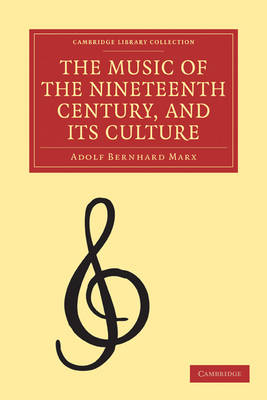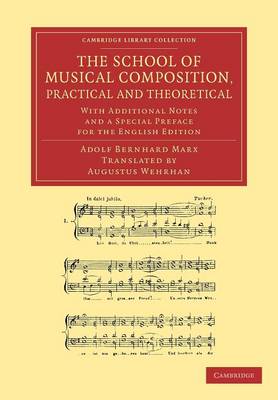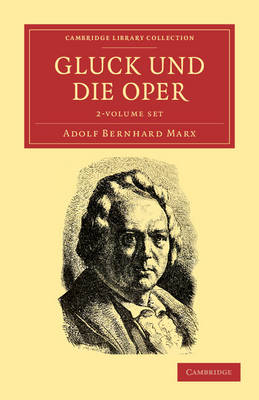Cambridge Library Collection - Music
2 primary works • 6 total works
Volume 1
Adolf Bernhard Marx (1795-1866), the music critic and composer, spent much of his career as professor of music in Berlin and was a friend and mentor of Mendelssohn. His publications included an influential textbook on composition and a biography of Beethoven. The preface to this two-volume study, published in 1863, ranks Gluck (1714-87) wtih Handel, Mozart and Beethoven at the pinnacle of musical achievement. Marx describes Gluck's radical innovations in operatic composition in the context of the wider European tradition, and sets them in a chronological account of the composer's life. Volume 1 covers Gluck's education, his early successes in Italy and travels in Europe, and his prolific output from 1750 to 1770, including the major, reformist works Orfeo, Alceste, and Paride ed Elena, all premiered in Vienna. Marx illustrates his analyses of plot, libretto and orchestration with numerous music examples, and quotations from Gluck's writings.
Volume 2
Adolf Bernhard Marx (1795-1866), the music critic and composer, spent much of his career as professor of music in Berlin and was a friend and mentor of Mendelssohn. His publications included an influential textbook on composition and a biography of Beethoven. The preface to this two-volume study, published in 1863, ranks Gluck (1714-87) wtih Handel, Mozart and Beethoven at the pinnacle of musical achievement. Marx describes Gluck's radical innovations in operatic composition in the context of the wider European tradition, and sets them in a chronological account of the composer's life. Volume 2 covers Gluck's later life, including his residence in Paris during the 1770s, where he enjoyed the patronage of Marie-Antoinette but encountered controversies and intrigues. Marx discusses operas including Iphigenie en Aulide and Armide, illustrating his analyses with music examples. The substantial appendix contains longer music extracts, a facsimile manuscript page, and an index of works.
Adolf Bernhard Marx (1795-1866) was an influential music theorist, critic, composer and pedagogue. He believed that music should be part of everyone's general education and lobbied the Prussian government for a comprehensive national music-education scheme. This English translation by George Macirone of Marx's 1839 Allgemeine Musiklehre was published in 1854 as the first work in the series Novello's Library for the Diffusion of Musical Knowledge. The series, described by the publisher as 'a collection of standard treatises on the art of music written by the most esteemed English and foreign masters', was devised in response to a growing demand for training books and manuals to support domestic music-making. It also included Berlioz's famous treatise on instrumentation (also reissued in this series). Marx's work covers the basic elements of music theory, musical instruments, compositional techniques, forms of music, performance advice, and the importance of musical education in general.
A. B. Marx (1795-1866) was a scholar, teacher and critic of music, for many years Professor of Music at the University of Berlin, and a close friend - before a falling-out over the libretto of an oratorio - of Mendelssohn. This influential book, published in German in 1855 and translated into English in the same year, consists of two parts: a survey of the significance of music to western culture, and an impassioned and thought-provoking guide to the necessary moral qualities, skills and understanding required to teach - and to be taught - music. Marx's appreciation of such composers as Mozart, Beethoven, Berlioz and Wagner is placed in a context in which music is seen as a crucial moral influence on the future development of mankind, and musicians therefore as playing a vital role in that development.
The School of Musical Composition, Practical and Theoretical
by Adolf Bernhard Marx
Published 17 April 2014
The influential music theorist and composer Adolf Bernhard Marx (1795-1866) spent much of his career as a professor of music in Berlin and was a friend and mentor of Mendelssohn. He believed music should be part of everyone's general education and lobbied the Prussian government for a comprehensive national scheme for musical education. His compositions included many songs and choral works now largely forgotten, with the exception of the 1841 oratorio Mose. Among his publications is Gluck und die Oper (1863) which is reissued in this series in both the German original and English translation. His most famous and influential work, Die Lehre von der musikalischen Komposition, was intended for the students of the University of Berlin, setting out in simple terms the principles of music theory and composition for the untrained. This English translation, of only the first volume of the fourth edition, was published in 1852.
Adolf Bernhard Marx (1795-1866), the music critic and composer, spent much of his career as professor of music in Berlin and was a friend and mentor of Mendelssohn. His publications included an influential textbook on composition and a biography of Beethoven. The preface to this two-volume study, published in 1863, ranks Gluck (1714-87) wtih Handel, Mozart and Beethoven at the pinnacle of musical achievement. Marx describes Gluck's radical innovations in operatic composition in the context of the wider European tradition, and sets them in a chronological account of the composer's life. Volume 1 focuses on Gluck's early career in Italy and northern Europe, and his enormously productive middle years in Vienna, 1750-70, where he premiered reformist works including Orfeo. Volume 2 covers his ten years in Paris, and includes a substantial appendix of music extracts. Marx illustrates his analyses with music examples, and quotations from Gluck's writings.



